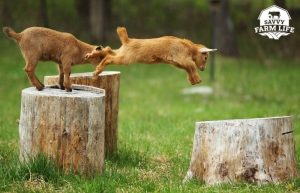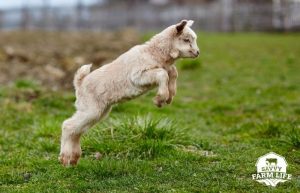
What You Need to Know About Why Goats Jump
One of the obstacles many homesteaders face when considering keeping goats is their propensity to escape. More specifically, their ability to jump over fences that will easily contain any other livestock. So why do goats jump? And what can you do to keep your goats grounded?
Why do goats jump? Goats jump for various reasons, and those reasons may be different depending on the age of the goat. Baby goats will jump more often than adults, for many reasons – including play, as a defense against predators, and to impress their peers. An adult goat will jump to find food or because they are curious.
Goats are interesting livestock to have on the farm, with no shortage of quirky and endearing behaviors. While a hopping baby goat will bring a smile to anyone’s face, it can become a problem when this same behavior leads to your goats escaping. Read on to learn more about this behavior and what you can do to keep your goats safe and secure.
It’s a Goat’s Natural Instinct to Jump
The natural habitat of the goat includes cliffs, mountainsides, and canyons. Goats have evolved into climbing, jumping machines – jumping as high as 12 feet in one bound. This ability helps them not only find food but also evade most predators.
Predators of mountain goats (and domestic goats, depending on your region) include bears, coyotes, and mountain lions. Because of the goat’s hoof anatomy, they can grab onto the smallest of ledges with the hoof wall and maintain stability with their abrasive and spongy footpads. While coyotes and bears will have difficulty with the goat’s preferred terrain, mountain lions will, on occasion, be able to climb the cliffs in an attempt to get to the goats. During this situation, the goat’s ability to jump becomes a life-saving ability, allowing the goat to jump from one ledge to the next deftly.
Genetics will not change simply because a trait is no longer needed for survival. Some may argue that depending on the predators in your area, domestic goats can still use their jumping tendencies as a survival mechanism. Jumping is in the genes.
Jumping Can Land Goats into Trouble
While jumping is used as a survival mechanism, it can also get a goat into serious trouble. You may have seen a video online of a mountain goat in Greece that was found hanging by its horns from a 20-foot telephone wire. There was no structure around that the goat could easily have jumped from, and no one had been around to see how this goat was able to find himself stuck 20 feet in the air. It is easy for goats to get stuck in precarious positions by their horns and challenging to navigate their way out.
Those wondering what came of the goat were rescued with a ladder and a rope and ran off as if nothing had happened! You can watch the video here:
Why do Baby Goats Jump?
You will usually see baby goats jumping much more often than adult goats. When you see a baby goat jump straight into the air with all four feet, this is called “stotting.” What are some of the reasons that baby goats will jump?
Baby Goats Jump for Play
Most baby animals are playful, and baby goats are no different. Young goats enjoy playing and use play as a way of learning how to socialize with their peers. Like a pouncing kitten and a puppy in his play stance, many theorize that jumping is a way a goat will entice others to play. I’ve had goats come up to me and jump around as a sign they wanted me to play with them! Want to learn more ways a goat may show affection? Check out my article Goat Affection: 10 Clear Ways Goats Show Affection.
Baby Goats Jump to Release Energy
I remember being a kid and having so much energy that my mom would make me go outside and play. One thing all young have in common is that they have more energy than their more mature counterparts. Young animals have seemingly endless energy, and that energy needs to be released. This is why you will see children doing somersaults through the grass, puppies spinning and chasing their tails, and kittens getting into all sorts of trouble.
Baby goats are no different, and many theorize that one reason baby goats jump is to expend some of this excess energy. When a baby goat is raised domestically, it may not have another natural way to let out this build-up.
Baby Goats Jump to Show Off
Another theory about baby goats is that they will jump to show off to their peers. This is typical behavior and can also be associated with play. Baby goats are trying to find their place in the herd, and one way to do that is to show off their athletic skills and impress their peers.
In addition to showing off for their peers, baby goats may also jump to show off their athleticism to predators. If a baby goat is seen leaping and jumping into the air, a predator may be less likely to consider them easy pickings and might leave them alone.
Why Do Adult Goats Jump?
While baby goats will jump more often than adult goats, adult goats will also jump – but usually with a goal in mind.
Adult Goats Jump for Food
Of course, the most apparent reason an adult goat will jump is to find food. Goats are not grazers but “browsers.” They will browse for their food, and they prefer to eat things at eye level. Goats can usually be found looking around for their next tasty treat – and often, this treat will be on the other side of a fence. When an adult goat (or baby goat, for that matter) jumps over a fence, you will often see them munching on their prize on the other side – oblivious to the trouble they are causing or the danger they may be putting themselves in. I once had a goat that would always escape from its pen to eat the shrubs in the garden around the house. 🤦♀️
Adult Goats Jump Out of Curiosity
Like the previous reason adult goats jump, this reason, of course, can also apply to baby goats. Goats are incredibly intelligent and curious by nature. Because goats are constantly browsing at eye level, they will often see something on the other side of an obstacle (fence) and will jump over to investigate.
Things You Can Do to Keep Goats From Jumping Out of Their Pen
 For the domesticated goat, jumping may become a problem. If your goat is regularly jumping over the fence, there are a few things you can do to help them remain safely in the enclosure you have created for them.
For the domesticated goat, jumping may become a problem. If your goat is regularly jumping over the fence, there are a few things you can do to help them remain safely in the enclosure you have created for them.
Build Higher Fences to Prevent Goats Jumping
A 4-foot fence may be adequate for your sheep, horse, and chickens, but you may not be able to contain your goats with a fence this tall (or rather, short). I recommend a fence of 5 to 6 feet in height to prevent goats from jumping out. You don’t have to replace the entire panel if you have a fence that you believe might be too short for your goats. You can purchase an 18-inch or 2-foot high roll of fencing and secure it to the posts at the top of your current fencing. Of course, this will only work if your posts can accommodate the additional height.
When choosing fence material, opt for woven wire, and always ensure no gaps greater than 4”. Goats are curious and can easily get their heads stuck in a gap greater than 4”.
Remove Jumping-Off Points From Goat Enclosure
One of my goats used to escape by climbing on top of their shed, then jumping over the fence close by. Even if you have a 6-foot fence, if you have a 4-foot tall playset, rock, or other jumping off point next to it, your goats will be able to jump the fence by first jumping onto the shorter point. You will commonly see goats on top of a chicken coop or a goat house, and from there, it will be easy to escape the enclosure. Make sure that you move all such structures at least 10 feet away from fences.
All of my goats have loved having things to climb on in their pen since it’s part of their natural instinct. Adding rocks, logs, and even a playhouse to your goat pen can give your goats some entertainment. To learn all the items you may need in a goat pen, check out my article What Goats Need in Their Pen: Complete List.
Electric Fences to Prevent Goats Jumping
Of course, when all else fails, electric wire added to the top of the existing fencing is quite effective at preventing goats from jumping over enclosures. Electric fencing has the added benefit of keeping predators out of the enclosure, keeping your goats doubly safe.
Keep in mind that jumping is only one way that goats escape their enclosures. As often as you will find a goat jumping over a fence, you will see the same goat escaping under the fence and squeezing through gaps in the fence. It is imperative to ensure there are no significant gaps in the fences, as a goat can stick his curious head through and get stuck by the horns, leaving it vulnerable to predators and unable to get to safety.
Some Goat Breeds Jump More Than Others
If you are researching goats because you are considering bringing them onto your farm, it is a must to research breeds of goats to find the right one for your family and environment. Smaller breeds of goats such as the Nigerian Dwarf Goat are more apt to jump the fences, while the larger breeds are less nimble and seem to be more content sticking to the ground.
Goats Will Always Jump But Can Be Contained
Because of their genetics, goats will always jump. By understanding the behavior behind their jumping and making adjustments to your fencing, you should be able to keep even the most fantastic goat Houdini safely on your property.
Want to learn some essential care tips from raising goats? Check out these articles below!
